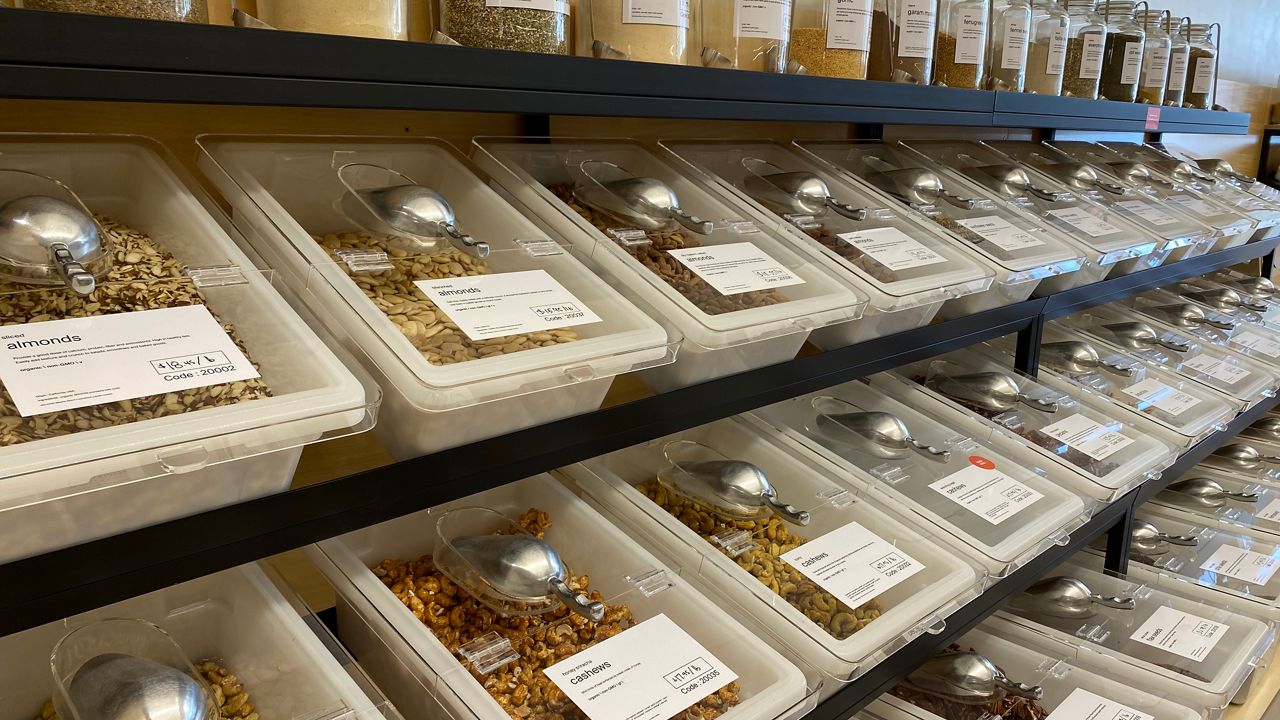LOS ANGELES – Walk into almost any grocery store, and the shelves aren’t just loaded with food but plastic. Between the ketchup bottles and bread bags, the drink containers and frozen food trays, the average American generates about a half pound of plastic waste each day, according to the U.S. Environmental Protection Agency.
“The problem is that a lot of companies are putting the waste on the people. They’re not responsible for their packaging,” said Joseph Macrino, co-owner of a new zero-waste grocery store in Highland Park called Tare. “We’re really trying to close that loop.”
Located in a small storefront on York Blvd., Tare offers about 400 different food stuffs that can be scooped from its bulk bins into refillable containers. Named for the system it uses to measure goods and charge customers, Tare starts by weighing empty containers on a scale, then adding an RFID tag that logs the weight of the empty container so it can be deducted from what’s inside. Whether it’s coffee beans, quinoa, pasta, vinegar, nut butters, or dry yeast, customers are charged based on the weight of the product.
If someone forgets to bring a container, Tare provides glass jars for a fee, or 100 percent post-consumer recycled paper bags for free.
Ordinarily, customers would tare their own containers using the scale and tags at the front of the store, and serve themselves from the bins. But COVID has prompted Tare’s employees to do all the serving instead.
“We’ll grab the peanut butter off the shelf for you. Even when people are bringing in their own jars, we have them use the hand sanitizer right as they enter, place the jars in the basket, and then we take it to the back and sanitize it,” said Macrino, who owns the business with his wife Lauren. “Literally no one is touching anything until they hand us their credit card at the end.”
Esther Oh, of East Hollywood, was shopping at Tare on a recent weekday to buy almond flour and tapioca starch.
“I just love that it’s so sustainable,” she said. “It just makes sense. You don’t need all of these things in giant bulk packages.”
Or with all the excess packaging that entails. Tare is part of a burgeoning movement in Northeast L.A. that includes so-called refill stations like Sustain LA, which sells mostly bath and beauty products, and Wild Terra, which sells a smattering of food and cleaning products but largely focuses on bulk herbs, spices, and teas.
Tare is unique in that it’s a grocery store, though it does not sell fresh produce or meats. It does, however, offer kombucha on tap and refrigerated items such as tofu and vegan cheese, as well as sustainable housewares and beauty products.
“We have a filter for everything we bring in. We try to find things that are organic, non-GMO, vegan, gluten free, local, obviously sustainable, and traceable,” said Macrino, who labels the products he sells with that same information.
In many cases, Tare has worked with companies to make their operations more sustainable upstream. Clevr Blends, which makes a popular superlatte powder that is usually sold in two-pound bags, sells it in 20-pound bags for Tare. Two other companies are working with Tare on closed-loop fulfillment, including its coffee supplier.
“How it works is they have three of our bins at their roastery, so when we place an order, they roast beans into the bins, and when they deliver it, we give them the old ones, so there’s literally no packaging.”
Tare has worked out a similar system with the beauty products brand, Youth to the People, based in downtown L.A.’s Arts District. Customers can bring back their empty containers, and Youth to the People will clean, sanitize, and rebrand the jar or bottle and put it back into the retail stream.
“Only a small percentage of stores are participating in refill programs of some sort,” said Marshal Cohen, chief retail analyst for the market research firm, NPD Group. “Most stores are focused on recyclable products and reusables rather than refillable because it’s less cumbersome.”
Still, Cohen said millennials are pushing brands to be more focused on sustainability.
“People want to make a difference. People want to do the right thing,” said Macrino, whose store opened, appropriately enough, on Earth Day. “They just need the opportunity to do it, so we’re just trying to give that to them.”



